“Yes, they exist!” What do Data Science specialists in Kazakhstan do and how much do they earn?
Dmitry Kazakov , Data Analytics Team Lead at the Kolesa Group, shares insights from the first Kazakhstan survey of data experts. In the photo: Dmitry KazakovRemember the popular phrase that Big Data most closely resembles teenage sex - everyone talks about it, but no one knows if it really is. The same could be said about the market of data specialists (in Kazakhstan) - there is a hype, but who is behind it (
In the photo: Dmitry KazakovRemember the popular phrase that Big Data most closely resembles teenage sex - everyone talks about it, but no one knows if it really is. The same could be said about the market of data specialists (in Kazakhstan) - there is a hype, but who is behind it ( and is there anyone at all ), it was not completely clear - neither to eychars, nor to managers , nor the data of the Scientists themselves.We conducted a study in which we interviewed more than 300 specialists about their salaries, functions, skills, tools and much more.Spoiler:Yes, they definitely exist, but everything is not so simple.Nice insight. Firstly, there are more data specialists than we expected. We managed to interview 300 people, among whom there were not only product-, marketing- and BI-analysts, but also ML-, DWH-engineers, which was especially pleasing. In the largest group were all those who call themselves data scientists - this is 36% of respondents. It is difficult to say whether this covers the market demand or not, because the market itself is only being formed. The distribution of job levels is embarrassing - there are almost as many team leaders and leaders as there are dzhuns. There may be several reasons for this. For example, a large number of small teams of 2-3 people, in which the head can be a specialist at the middle or senior level.
The distribution of job levels is embarrassing - there are almost as many team leaders and leaders as there are dzhuns. There may be several reasons for this. For example, a large number of small teams of 2-3 people, in which the head can be a specialist at the middle or senior level.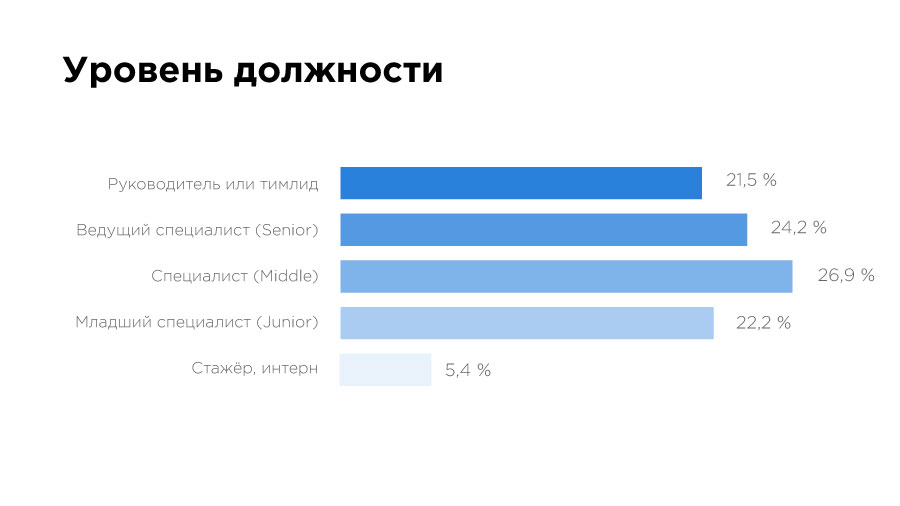 Another reason may be the chaos prevailing in the market in terms of standards in the distribution of roles and functionality. Timlids are sometimes appointed by those who simply work for a year or two longer than others, without reference to the level of skills and knowledge. We see this also in the distribution of functions by position - 38% of managers and team leaders are engaged in pre-processing and another 33% are engaged in basic statistical analysis.
Another reason may be the chaos prevailing in the market in terms of standards in the distribution of roles and functionality. Timlids are sometimes appointed by those who simply work for a year or two longer than others, without reference to the level of skills and knowledge. We see this also in the distribution of functions by position - 38% of managers and team leaders are engaged in pre-processing and another 33% are engaged in basic statistical analysis.
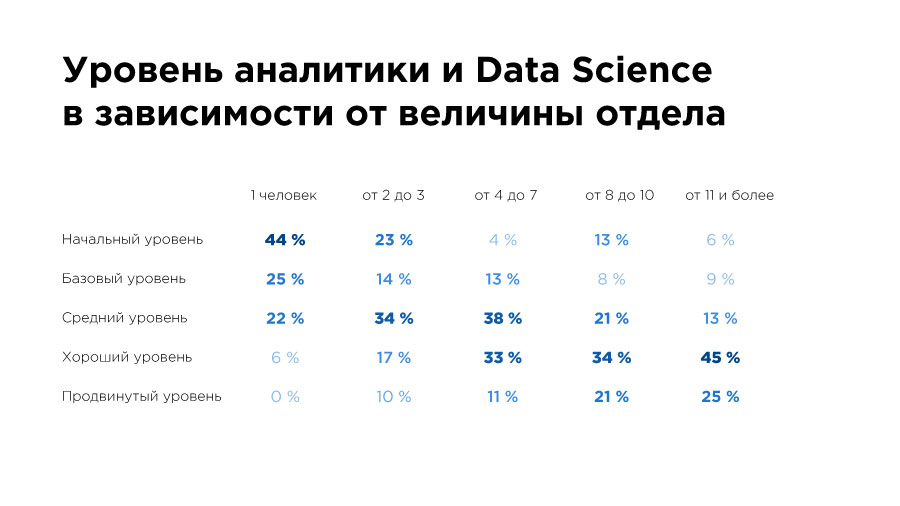 Here we asked respondents to subjectively assess the level of analytics in their companies. If you look closely, you can see that 10% of respondents who work in the analytic departments of 2-3 people think that they have an “advanced level”.And what is an “advanced level”? The BI system works fine. There are DWH and Big Data. A / B tests are performed regularly. There are working ML and DS systems in production. Decisions are made only according to the data. The department of work with data and Data Science is one of the key in the company.All of the above is almost impossible to achieve with a department of 2-3 people. I believe that such a survey result is a small growth disease - the guys have no one to compare themselves with in order to determine their level more objectively.
Here we asked respondents to subjectively assess the level of analytics in their companies. If you look closely, you can see that 10% of respondents who work in the analytic departments of 2-3 people think that they have an “advanced level”.And what is an “advanced level”? The BI system works fine. There are DWH and Big Data. A / B tests are performed regularly. There are working ML and DS systems in production. Decisions are made only according to the data. The department of work with data and Data Science is one of the key in the company.All of the above is almost impossible to achieve with a department of 2-3 people. I believe that such a survey result is a small growth disease - the guys have no one to compare themselves with in order to determine their level more objectively.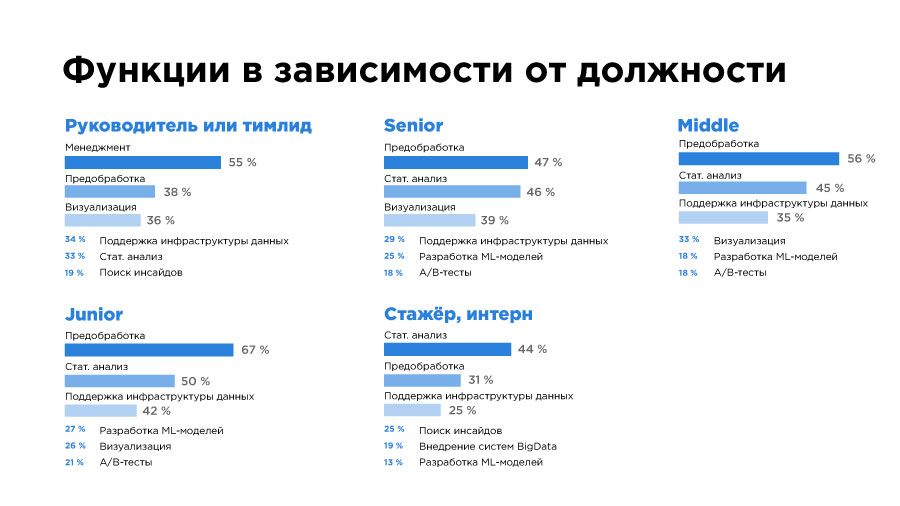
 It is expected that most of the time data specialists do not spend on super complex mathematics or engineering, but on preprocessing, uploading, and cleaning up the data. In each specialization, we see preprocessing in the top 3. But complex things like developing ML models or working with Big Data are extremely rare in the top 3 - only among ML and DWH engineers.
It is expected that most of the time data specialists do not spend on super complex mathematics or engineering, but on preprocessing, uploading, and cleaning up the data. In each specialization, we see preprocessing in the top 3. But complex things like developing ML models or working with Big Data are extremely rare in the top 3 - only among ML and DWH engineers.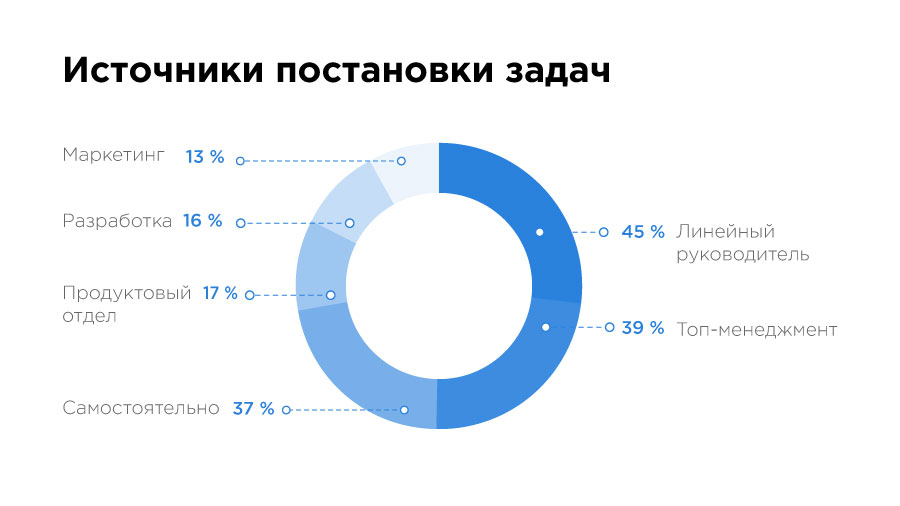 There are a couple of sad insights. 40% of the tasks experts set themselves. In Kazakhstan, so far only the top unicorn companies have tested the benefits of working with big data and learned how to do it competently. They broadcast to the market that Big Data and Machine Learning are cool, and the second tier is following, but far from always understanding how the work with data is arranged. Therefore, we see that the experts set tasks for themselves, and the business does not always know what it wants.
There are a couple of sad insights. 40% of the tasks experts set themselves. In Kazakhstan, so far only the top unicorn companies have tested the benefits of working with big data and learned how to do it competently. They broadcast to the market that Big Data and Machine Learning are cool, and the second tier is following, but far from always understanding how the work with data is arranged. Therefore, we see that the experts set tasks for themselves, and the business does not always know what it wants.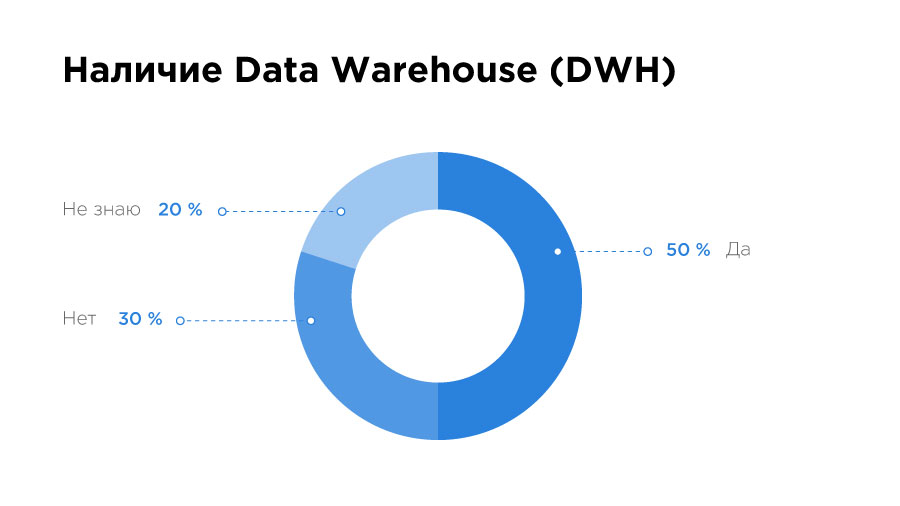 I was surprised that 20% of specialists do not know at all whether their company has a Data Warehouse. Yes, and with database management systems, not everything is so good - 41% use MySQL, and another 34% use PostgreSQL. What can it talk about? They work more with small data.
I was surprised that 20% of specialists do not know at all whether their company has a Data Warehouse. Yes, and with database management systems, not everything is so good - 41% use MySQL, and another 34% use PostgreSQL. What can it talk about? They work more with small data. In the question about storage systems, we again see MySQL and even (!) Excel. But this may indicate, for example, that most companies simply do not yet have a request for working with big data.
In the question about storage systems, we again see MySQL and even (!) Excel. But this may indicate, for example, that most companies simply do not yet have a request for working with big data.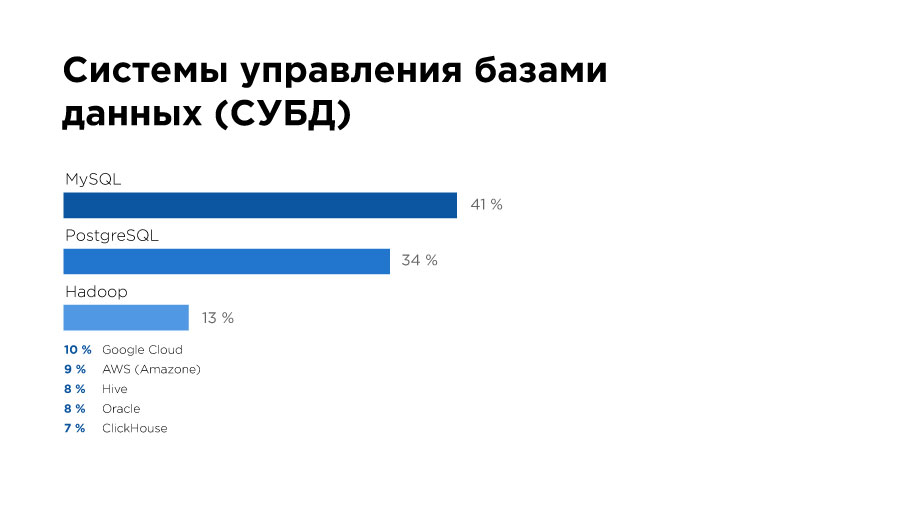 Everything here is again ambiguous. In general, salaries were slightly lower than I expected.
Everything here is again ambiguous. In general, salaries were slightly lower than I expected. Personally, it’s hard for me to imagine an ML engineer who is ready to work for 200 thousand tenge - probably this is an intern. Either the competencies of such specialists are very weak, or it is still difficult for companies to adequately evaluate the work of Data Science. But perhaps this also suggests that the market is still at the very beginning of its growing up. And over time, the level of salaries will be established at a more adequate level.
Personally, it’s hard for me to imagine an ML engineer who is ready to work for 200 thousand tenge - probably this is an intern. Either the competencies of such specialists are very weak, or it is still difficult for companies to adequately evaluate the work of Data Science. But perhaps this also suggests that the market is still at the very beginning of its growing up. And over time, the level of salaries will be established at a more adequate level. Source: https://habr.com/ru/post/undefined/
All Articles